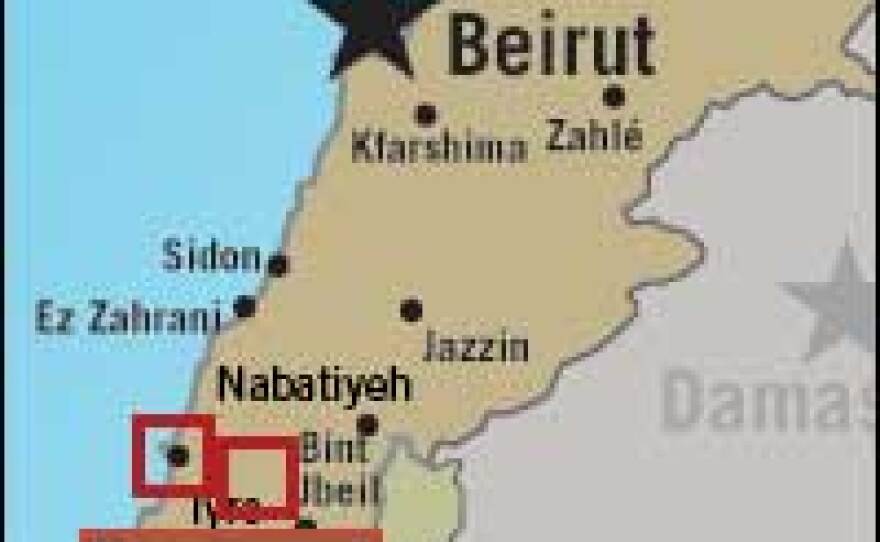
Israel's Prime Minister Ehud Olmert delivered a stark message Monday: "There is no cease-fire."
Israel launched new airstrikes in south Lebanon, despite an agreement to suspend air attacks for 48 hours.
"There is no cease-fire and there will not be any cease-fire in the coming days," Olmert said in a speech to mayors of towns in northern Israel. "We will stop the war when the threat is removed.... Our captive soldiers return home in peace, and you are able to live in safety and security."
Olmert added: "Citizens of Lebanon, we are sorry for the pain caused to you, and the fact that you had to pick up and flee your homes, and also the casualties caused among innocents. But we will not apologize to those who put a question mark on the right of Israel to exist."
Israeli Defense Minister Amir Peretz sounded a similar message Monday, telling Israel's parliament, "The army will expand and deepen its actions against Hezbollah."
Israeli Brig. Gen. Ido Nehushtan told NPR that Israeli airstrikes will target "immediate threats," including Hezbollah missile launchers.
Fighting between Israel and Hezbollah guerrillas based in southern Lebanon is now in its 20th day.
On Monday, Israeli ground forces launched a fresh offensive inside southern Lebanon. Hezbollah fighters were returning fire.
Also, Israeli bombs hit several targets. A rocket killed a Lebanese soldier and wounded three others, when their car was targeted.
But NPR's Mike Shuster, who's in northern Israel near the Lebanese border, says a "limited suspension" of hostilities appears to be holding. Shuster says he can hear some bombs falling in the distance, "but it hasn't been anything like the intense air campaign of the last two-and-a-half weeks."
Shuster says Hezbollah is also continuing to rain rockets on northern Israel, but these strikes, too, are "much diminished from previous days." He says Hezbollah used anti-tank missiles Monday to put a couple of Israeli tanks that were inside Lebanon out of commission.
Grief, Anger in Qana
The partial suspension of airstrikes follows the bombing Sunday of an apartment building in the southern Lebanese town of Qana, that left more than 50 people dead, many of them children.
NPR's Ivan Watson has been following rescue teams in Qana, who are digging through the rubble of the collapsed building. Watson says Israeli airstrikes appear to have destroyed about half the village, including a mosque. Israeli warplanes and unmanned spy drones continue to circle overhead.
Watson says the grief and anger in the town is overwhelming. He interviewed Yahya Dagher, a Qana resident whose family escaped the deadly attack. Dagher vowed to sleep in his own house tonight, despite Israeli warnings to leave the area. And he offered this message for Israel: "We will erase it. We will erase Israel. We will cancel it from the map."
Uncertain Path for Diplomacy
The bloodshed in Qana has ratcheted up international pressure to end the fighting.
But there's no clear path ahead for diplomacy.
At the United Nations, a key meeting has been indefinitely postponed. The session, which had been scheduled for Monday afternoon, was to plan for a new peacekeeping force for Lebanon.
U.S. ambassador John Bolton downplayed the delay as merely a scheduling issue. But NPR's diplomatic correspondent Michele Kelemen reports that French diplomats are signaling deeper differences.
French ambassador Jean Marc De la Sabliere says, "We thought (the meeting) was premature." France is circulating a draft resolution at the United Nations, calling for an immediate end to the fighting, and seeking a wide new buffer zone in southern Lebanon.
That approach is at odds with the one favored by top U.S. officials. Secretary of State Condoleezza Rice has outlined a proposal under which both Israel and Lebanon would agree to a cease-fire as part of a larger deal that includes deploying international peacekeepers in southern Lebanon.
There's still a long list of outstanding questions to be resolved before diplomats can cut a deal. It's unclear, for example, which countries would participate in a multinational force. France has emerged as a likely leader, and Italy would also probably contribute troops. Britain and the United States have ruled out participating.
Also unresolved is the issue that sparked the 20-day-old crisis: the fate of two Israeli soldiers captured in a cross-border raid. Israel is demanding their release. Hezbollah, for its part, wants the release of Lebanese who have been held for years in Israeli prisons.
And there's the long-festering question of Shebaa Farms, a piece of land held by Israel and claimed by both Lebanon and Syria. It's under U.N. supervision until its status can be resolved. Rice calls it's a problem that "definitely needs to be resolved."
Still, Rice struck an optimistic note Monday, as she wrapped up an eight-day foreign trip. Rice told reporters, "As I head back to Washington, I take with me an emerging consensus on what is necessary, for both an urgent cease-fire and a lasting settlement. I am convinced we can achieve both this week."
Copyright 2022 NPR. To see more, visit https://www.npr.org. 9(MDAzMjM2NDYzMDEyMzc1Njk5NjAxNzY3OQ001))







